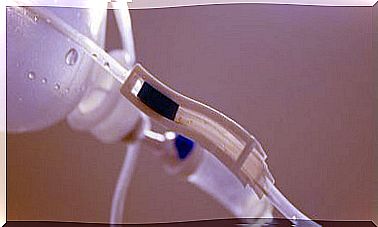5 Tips For Visiting A Hospitalized Patient
Hygiene is one of the fundamental maxims when visiting a patient, since the hospital environment is already full of microorganisms

When we go to visit a hospital patient, we can find phrases like: “lower your voice”, “wait outside” and the popular “visits are until six in the afternoon.
Perhaps the hospital is one of the human institutions with more regulatory requirements, but each provision has a logical reason. How to visit a patient in the hospital?
The health care centers establish under their rules a form of harmonious coexistence between doctors, nurses, patients and relatives.
The purpose: to maintain order in the midst of distressing moments.
What many forget is that some of those norms to visit a patient seek the physical and psychological care of the admitted and also of the visitors.
The following tips will help when visiting a hospitalized relative or friend.
1. The best way to visit a patient: Speak quietly

It seems simple, but the silence of the clinics is essential for the recovery of the sick and the execution of the doctors.
- A single cry can cause a bad cut by the surgeon specialist and cause terrible damage to the patient.
- This is without taking into account the fact that some hospitalized patients enter due to heart failure.
- Any alteration of the quiet environment could be lethal to third parties.
As this is a general rule of all healthcare centers, it is best to enter with a prudent and cooperative attitude from the beginning.
It is also essential to contribute to harmony within the venue.
2. Extreme hygiene

Clinics are closed spaces that house a large number of people affected by viruses, infections and bacteria of different types.
Neatness is its hallmark, but the nature of these sites lends itself to the potential spread of disease.
The prudent thing is to take certain hygienic measures during the visit.
- In principle, it is vital to disinfect your hands with alcohol or liquid pocket soap before touching a patient.
- Subsequently, we must avoid taking this part of the body to the face, mouth or nose without first cleaning them again.
- Also, it is not a bad idea to disinfect our mobile phone the moment we arrive.
- It is advisable to wait to leave the clinic to eat food.
- The goal of all these strategies is to prevent the transmission or reception of contagious conditions.
3. Avoid controversy
The waiting rooms are filled with hundreds of conversations that we initiate in order to cope with the anguish.
It is necessary to know how to keep each interaction in a friendly tone and avoid issues that can lead to tension.
A golden rule when visiting a patient is to avoid touching political, religious and other topics of a similar nature, which can arouse debates and conflicting reactions within the hospital complex.
Family controversies can also lead to quarrels that will not be accepted in a clinic.
- Worrying about the health of a loved one involves anger, fear, frustration, and nervousness.
- The appropriate thing in these cases is to make simple talks and keep listening active.
4. The clinic is not a good place for children.

Medical centers are cold, boring, and quiet. Children generally run away from sites that display all three of these attributes.
So things tend to get complicated when they are forced to stay for hours in such harsh environments.
Unless the child is the patient, it is advisable to leave him at home under the care of a babysitter or family member.
- The risk that a child runs of contracting a virus is much higher than that of an adult.
- In addition, the child will not be aware of washing his hands as a precaution every time he touches something.
Added to this, there is a high probability that the little one will get bored. Then he will begin to show inappropriate behavior in a waiting room or, worse still, in a sick room.
- Yelling, running, and jumping are some examples.
5. The patience to visit a patient
It is one thing to be worried and quite another to bother. Checking the health status of our loved one every 20 minutes will not speed up their improvement.
Contrary to this, we generate nervousness in the doctors. We precisely need your serenity and clarity.
A single doctor can be in charge of eight or ten patients in the same night. This is the reason why they are constantly turning from there to here.
Another improper practice is to pressure different nurses to expedite a treatment or procedure.
What a clinic requires of its visitors is a little patience so that the harmony and work methodology is not broken.
Complying with these guidelines will allow us to contribute to the order that patients need to be treated.









